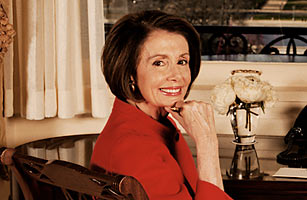
Speaker of the House Nancy Pelosi sits at her desk in Washington, DC.
(3 of 4)
Pelosi carries two cell phones but no BlackBerry. There is no computer in her office and no real desk, just a table by the window big enough to fit her telephone, her paperwork and a bowl of peonies. It is there that Pelosi, who will be 70 in March, spends her spare moments working on a steady output of handwritten notes. When a colleague's mother dies, the Speaker encloses a poem written by her own mother with her condolence.
While Pelosi keeps dozens of mementos nearby, two framed photos are aligned like bookends. One shows 7-year-old Nancy D'Alesandro, in white gloves and a crownlike headband of tulle, holding the Bible as her father is sworn in as mayor in front of Baltimore City Hall in 1947. The other shows a frail Tom D'Alesandro at his daughter's side four decades later, on the day she first took her own oath of office as a member of the United States House of Representatives. He died two months later.
The future Speaker learned the fundamentals of politics in the living room of 245 Albemarle Street in Baltimore's Little Italy section. It was there that Nancy, the youngest of six and the only girl, stuffed envelopes, learned to count votes by precinct and helped manage a box of index cards known as the "favor file." It held a record of every supplicant who had received a job, a building permit, a bed in a city hospital. Come election time, reciprocation was expected.
It was also expected that the D'Alesandro boys would follow in the family business. But not Nancy, "the princess of the family," says her brother Tommy, the namesake son who would himself later be mayor of Baltimore. She was chauffeured to the Institute of Notre Dame a mile away (though she was embarrassed enough by that to insist on walking the last block). Her mother Annunciata made no secret of her hope that her daughter would become a nun. "Tommy was groomed to be mayor," Nancy would say, "and I was raised to be holy." Still, her mother sided with Nancy in her battle with her father to be allowed to go 37 miles away to Trinity College in Washington. While taking a summer class in 1961 at nearby Georgetown University, Nancy met a native San Franciscan named Paul Pelosi, and the two were married two years later.
In the space of six years, Nancy gave birth to four girls and a boy. Between driving carpool and sewing Halloween costumes and laying out a daily assembly line of wheat bread and sandwich meat from which the kids would make their lunches, Pelosi got heavily involved with San Francisco's Democratic scene as a fundraiser and hostess. For all the city's hippie-dippy image in the 1960s and since, San Francisco politics are an obstacle course of fragile alliances, simmering rivalries and a bewildering array of interest and ethnic groups. "Baltimore was a proper introduction to politics in San Francisco," Pelosi says with a laugh.
As state party chairwoman, Pelosi was instrumental in bringing the 1984 Democratic National Convention to San Francisco. With her fundraising skills in one of the few states where rich people opened their wallets to Democrats during the Reagan era, Pelosi had made herself indispensable to national party leaders. And then came a summons in 1987 to the bedside of dying Congresswoman Sala Burton, who had won her seat as the widow of legendary Capitol Hill power broker Phillip Burton. Pelosi had been in the trenches with both Burtons; Sala wanted to know if she wanted the job.
Pelosi said yes, and Burton bestowed her blessing five days before she died. It was a short, brutal and close race, one in which Pelosi fought a charge that she, as the wife of a financier who lived in posh Pacific Heights, was no more than a dilettante. And oddly, if you compare that with her image today, she was actually the conservative on the ballot; among Democratic voters, she finished second to openly gay supervisor Harry Britt, but eked out enough Republican support to win the race by 3,990 votes.
She arrived in Washington by tragic happenstance, with no long-term game plan in mind, she says. "I never had any intention of running for leadership. None whatsoever. I really didn't know how long I would stay in Congress."